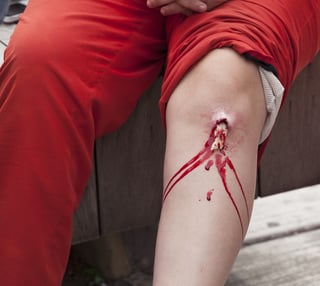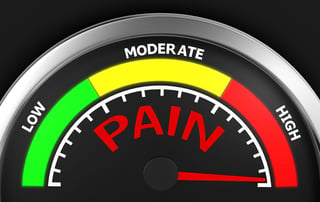What is considered an orthopedic emergency?
January 11th, 2017 | 4 min. read


Getting bumped and bruised is a part of life for many people. Children, being natural climbers, fall off playground equipment and furniture. Adults hit the ground after slipping on wet floors or ice. Every day, people of all ages stub their toes, hit their heads, drop things on their feet, bang their funny bones, jam their fingers in doors, or sustain injuries while playing sports.
Humans are infinitely talented and creative when it comes to getting hurt. But when is an injury more than a badge of honor or a funny story?
To take care of yourself and others, it’s critical to understand when a bump or bruise becomes an orthopedic emergency: a condition that need to be seen by an orthopedic physician the same day. It’s equally important to recognize when sudden changes in your orthopedic health require a same-day office visit.
What is an orthopedic emergency?
Simply put, an orthopedic emergency occurs when you injure bone or soft tissue in a way that requires immediate treatment to avoid further trauma or harm to your body. Orthopedic emergencies can be the result of a sudden acute injury or trauma, or they could be complications from existing condition or surgery.
Orthopedic emergencies from injury, for example, might include:
- Fractures (broken bones) requiring closing or alignment, surgery, splinting, or casting
- Concussions
- Dislocations
- Tendon ruptures
Orthopedic emergencies resulting from an existing condition or following surgery might include:
- Infection
- Swelling that blocks blood flow
- Re-injury of the damaged bone or tissue
- Blood clots
Some orthopedic emergencies may require ER visits, while others can be treated by a same-day visit to an orthopedist.
When to go to the ER
It’s important to note that severe, acute trauma usually necessitates an ambulance or a visit to the ER. For example, you need to get to a hospital right away if you:
- lose consciousness
- have a compound fracture that breaks the skin
- have a closed fracture and cannot use your affected limb (for example, a broken arm or leg)
- are bleeding from a deep cut
- are in a serious workplace or automobile accident
For a less serious injury, a visit to a walk-in or urgent care clinic may be advisable if you have a high fever (103 degrees or higher) in conjunction with a musculoskeletal injury. High fever can be a sign of infection, which can lead to life-endangering complications like sepsis.
When to seek a same-day orthopedist consultation
If you’re not severely, acutely injured as described above, but you are having sudden mobility problems, swelling, fever, or a notable increase in the amount of pain you’re experiencing, you may have an orthopedic emergency that can wait a little longer — but which still necessitates a same-day visit to an orthopedic specialist.
This advice applies particularly to anyone who’s been seeing an orthopedist for a pre-existing condition or who has recently undergone procedures like lumbar surgery, arthroscopy, injections, or a joint replacement.
If you can answer “yes” to the questions on the following checklist, you should call an orthopedist right away.
Checklist: Is it an orthopedic emergency?

- Have you broken a bone?
- After hitting your head, are you experiencing concussion symptoms like blackouts, memory loss, nausea, vomiting, or dizziness? (For more symptoms, click here.)
- Following an accident, injury, or fall, is your limb or joint not aligning into place properly, or are you having trouble using it?
- After orthopedic surgery, are you experiencing unexpected bleeding or fluid coming from your wound?
- Do you have a sudden swollen joint with pain, fever, and chills? These symptoms indicate a possible joint infection. Joint infections should not be left to fix themselves, as they can spread or become septic.
- Do you have osteoporosis— and suddenly feel pain in your thigh or groin, or have difficulty walking? You may have a hip fracture.
- Do you have any of the following symptoms following your joint replacement or fracture repair surgery? These are possible signs of a blood clot in the lungs.
- Chest pain?
- Cough?
- Shortness of breath?
- Do you have a sudden onset of calf pain following recent lower-body orthopedic surgery (back, legs, or hip)? This pain could indicate deep vein thrombosis, a blood clot in the leg that can travel to the lungs.
- Do you have a noticeable increase in pain if you’ve fall or twisted a limb following orthopedic surgery? You may have a new fracture, a change in fracture fixation of your old fracture, or a joint dislocation.
- If you wear a cast — do you notice swelling, numb fingers or toes, or pain that’s increasing? You may have cast compression syndrome — a condition where pressure builds up inside a muscle. This can happen rapidly and is dangerous.
- Following spinal surgery or an epidural injection, do you have sudden, severe back pain, weakness in your legs, or difficulty urinating? You may have bleeding around the spinal cord.
- Do you have swelling around the site of a recently repaired fracture (especially the elbow)? Serious swelling can impede blood flow, damaging muscle and other tissue.
The bottom line: a sudden change in your condition is cause to call your doctor.
If you’re post-operative or have recently had fracture repair or orthopedic treatment, call your orthopedist before going to the ER or an urgent care clinic.
Because he or she has special knowledge of your condition or injury, your orthopedist may need to be in close contact with the physician on-call.
What about pain — is that an indicator of emergency?
 Not necessarily. Pain levels alone aren’t always the best indicator of an orthopedic crisis. For example, certain chronic conditions like migraines, tendinitis, arthritis, or bursitis can cause incapacitating pain, flare-ups, and at times, agony — but they are not life-threatening. Pain is unfortunately a hallmark of the condition or disease.
Not necessarily. Pain levels alone aren’t always the best indicator of an orthopedic crisis. For example, certain chronic conditions like migraines, tendinitis, arthritis, or bursitis can cause incapacitating pain, flare-ups, and at times, agony — but they are not life-threatening. Pain is unfortunately a hallmark of the condition or disease.
However, new or unexpected pain or tenderness should not be ignored, especially in conjunction with other complaints. It’s possible to overlook subtle symptoms of a dangerous underlying problem.
For example, a small child or an elderly person may not show any clear sign of physical injury — no broken bones, bumps, or bruises. But if she has a fever, is lethargic, or is refusing to walk or move around, she may have an infection of the joints. Untreated infections of any kind, especially in children and the elderly, are considered emergencies requiring urgent medical intervention (and usually medicine) to avoid complications.
Risks of Not Seeing an Orthopedist Right Away
If you have an injury like a concussion, bone break, or ligament or tendon damage, not seeking treatment could have serious consequences for your health.
Though you may be tempted to “toughen up” or “ride it out,” damage to bone, muscle, ligaments, or tendons is not something you can afford to ignore completely. Untreated injuries can lead to even worse problems: health complications and also added expense and inconvenience as the original injury compounds and leads to disability.
- Untreated concussions, for example, can lead to permanent emotional issues, balance problems, depression, and even stroke.
- Untreated fractures can cause deformity, nerve damage, muscle or ligament damage, blood clots, and tissue or bone death.
- Untreated soft tissue tears and ruptures (like rotator cuff tears, ACL ruptures, and Achilles tendon ruptures) can affect your gait and hasten the development of osteoarthritis.
- Untreated osteoporosis can result in a series of fractures — including fractures of the spine and hips — that can make walking difficult to impossible.
Even if you heal on your own, in the the long run, the cost of an untreated injury can be much higher than getting treatment right away.
Why put your health, your ability to function, and your independence at risk when you can pick up the phone and make an appointment to see an orthopedic specialist today?
Contact us today at Coastal Orthopedics in Corpus Christi, Texas if you have any questions or concerns about your orthopedic needs at : 361.994.1166. Or click here to submit a request for a consultation today!
Article written by: Rob Williams, MD
Dr. Williams has been practicing orthopedic surgery in Corpus Christi since 1998. After graduating from Texas Tech hereceived his medical degree from the University of Texas at San Antonio. At the prestigious Campbell Clinic located at the University of Tennessee, Dr. Williams completed not only an Orthopedic Surgery Residency, but an additional year of Fellowship Training in Spine Surgery. Dr. Williams is dedicated to creating an excellent patient experience in the office or in the surgery suite.


